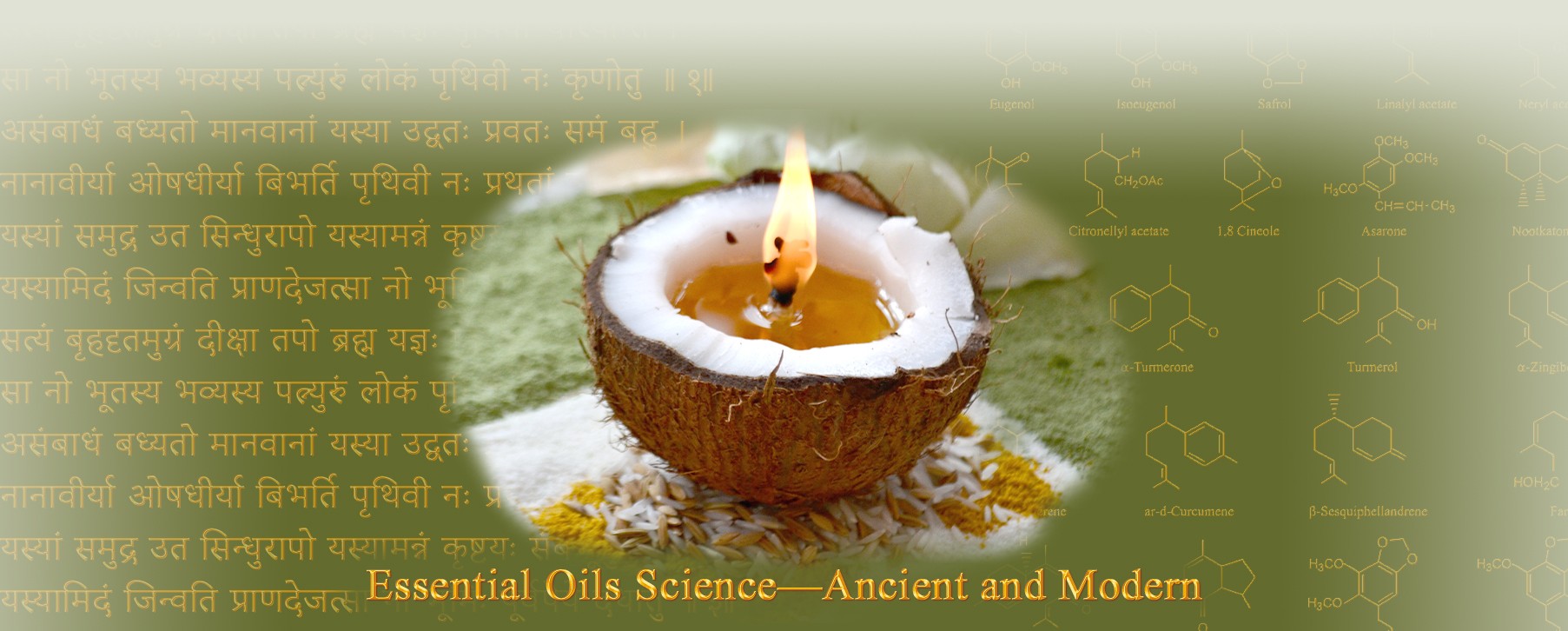Essential Oils Science
Ancient and Modern
Research on plant life has shown that plants react differently when approached by different people.
Plants as living beings, composed of the five elements, have a physical, emotional, and spiritual life. Above their primary purpose of providing food, they have since time immemorial been used for the higher purpose of healing.
Distillation is an alchemical process which establishes a link between the consciousness of the operator and that of the plant, with the purpose of inviting the plant to yield its healing essence abundantly.
ANCIENT
‘Along the bank of the river, on this side and that, will grow all kinds of trees used for food; their leaves will not wither, and their fruit will not fail. They will bear fruit many months, because their water flows from the sanctuary. Their fruit will be for food and their leaves for medicines.’
Old Testament
Ezekiel 47.12
Scent that has risen from thee, O Earth, the fragrance which growing herbs, and plants, and waters carry, shared by Apsarases, shared by Gandharvas, therewith make thou me sweet; let no one soever disfavour me.
Thy scent which entered and possessed the lotus; the scent which they prepared at Sūryā’s bridal (setting forth)—scent which Immortals, O Earth, of old collected—therewith make thou me sweet; let no one soever disfavour me.
Atharva Veda
Kāṇda 12, Sūkta 1,
Atharvan 23–24
ITIHĀS
the structuring dynamics of Natural Law in the VEDA (Knowledge), in Consciousness, in Physiology, and in the Ever-Expanding Universe
Maharishi Mahesh Yogi, in his Vedic Science and Technology of Consciousness, has brought to light the ITIHĀS aspect of the Vedic Literature, which documents the total range of human experience—the full Blossoming of Totality—the display of Natural Law in thought and action, and the structuring of all speech and action.
ITIHĀS comprises the specific sets of Laws of Nature that are engaged in promoting the quality of the knower, process of knowing, and the known, three qualities of consciousness or intelligence within the unified, holistic nature of consciousness. ITIHĀS therefore is that quality of Natural Law that provides a structure to the eternally silent, self-referral, self-sufficient, fully awake state of consciousness, which is intimately personal to everyone, because it is the intelligence that structures the physiology, maintains its orderly functioning, and upholds its balanced relationship with the physiology of the universe.
This Blossoming of Totality quality of intelligence, highlighted in ITIHĀS in the text of its great epic called the RĀMĀYAṆ, has also been identified in the structure and function of the human physiology. (Refer to the Maharishi University of Management Press publication: Human Physiology: Expression of Veda and the Vedic Literature.) The VEDA and VEDIC LITERATURE present the uncreated, self-perpetuating, eternal dynamics of the intelligence of Nature, the Laws of Nature that uphold human physiology and the physiology of the ever-expanding universe. The realisation of this ultimate reality, the understanding and the utility of it, will raise individual life to the universal dignity of Cosmic Life, a reality expressed throughout the VEDIC TEXTS in the expression—Yathā Piṇḍe Tathā Brahmāṇḍe: As is the atom, so is the universe; as is the body, so is the Cosmic Body.
Rāmāyaṇ, Valmiki Yuddha-Kanda
Cantos 73 and 74
- 73 A missile presided over by Brahma and loosed by Indrajit renders Shri Rama and Lakshmana, as well as the whole army of monkeys unconscious.
- 74 Under instructions from Jambavan (the lord of bears) Hanuman fetched a hillock clothed with celestial herbs, and inhaling the odour of those herbs, Shri Lakshmana and all the monkeys regain their normal health.
An excerpt from Canto 74
Inhaling the unique fragrance of the powerful herbs, both the aforesaid sons of a ruler of men were healed of their wounds then and there, and other eminent heroes among the monkeys (who were lying unconscious on the battlefield) sprang on their feet.
Nay, even those eminent heroes among the monkeys who had been killed were healed of their wounds and rid of their pain in an instant by (inhaling) the fragrance of these most excellent herbs, even as those who are asleep would feel when fully awake at the close of night.
…Thereupon the monkey sprung from the wind-god (literally the wafter of odour) for his part, who was endowed with tremendous speed, bore the aforesaid mountain full of medicinal herbs, with all speed right to the Himalaya mountain and joined Shri Rama once more.
Rāmāyaṇ, Valmiki
Yuddha-Kanda
An excerpt from Canto 91
[Lakshmana, Vibhisana, and others approach Shri Rama with the news of Indrajit’s fall. Delighted with the news, Shri Rama embraces Lakshmana and applauds him and gets Lakshmana and others treated by Susena.]
Having restored his aforesaid brother to confidence and hugged him, and accosting Susena, the celebrated Shri Rama, a scion of Raghu, joyfully spoke to him as follows:
‘Treat Lakshmana properly in such a way, O highly intelligent one, that this son of Sumitra, who is fond of his friends, may be rid of pain caused by arrows that have penetrated into his body and may be completely healed.
‘Let this son of Sumitra, along with Vibhisana, be speedily rid of pain caused by arrows that have penetrated into their body. Nay, let all the others too among the gallant bear and monkey warrior fighting with trees, who have fought on the battlefield and stand pierced with arrows and wounded, be healed by you with all care.’
Requested as aforesaid by Shri Rama, the high-souled Susena, a commander of monkey troops, administered a sovereign remedy to Lakshmana through the nose.
Inhaling the odour of the herb, Lakshmana was freed from arrows then and there and rid of his pain, and his wounds too got completely cicatrized [formed scar tissue and healed up].
At the command of Shri Rama, Susena (also) forthwith treated his friends, Vibhisana and others, as also all the monkey chiefs.
Restored to his normal state and freed from the arrows, his lassitude having gone and his anguish disappeared in an instant, the son of Sumitra felt delighted on the occasion.
On that very occasion Shri Rama as well as Sugriva as also Vibhisana and the valiant Jambavan with their troops rejoiced for a pretty long time on beholding the son of Sumitra sound, active, and full of joy.
MODERN
Essential oils: a systematic review on revolutionizing health, nutrition, and omics for optimal well-being
Published in: PubMed Central (PMC), Front Med (Lausanne). 2024 Feb 16
These essential oils have science-backed health benefits
Published by: Washington Post; July 15, 2024
Link: washingtonpost.com/wellness/2024/07/15/essential-oils-benefits/
Essential oils for clinical aromatherapy: A comprehensive review
Published in: Journal of Ethnopharmacology, Volume 330, 10 August 2024, 118180
Link: ScienceDirect, Elsevier
The Effects of Essential Oils on the Nervous System: A Scoping Review
Published by: MDPI; 27 April 2023
Effectiveness of aromatherapy for prevention or treatment of disease, medical or preclinical conditions, and injury: protocol for a systematic review and meta-analysis
Published by: BMC – Systematic Reviews; 26 July 2022
Link: systematicreviewsjournal.biomedcentral.com/articles/10.1186/s13643-022-02015-1
Effects of Essential Oils on Scars and Wound Healing:
A Systematic Review — Northwestern Scholars
Published by: Northwestern University; Sep 7 2022
Do Essential Oils Work? Here’s What Science Says
Published by: SciAm; March 7, 2020
Link: scientificamerican.com/article/do-essential-oils-work-heres-what-science-says/
Essential Oils and Health
Published in: Yale J Biol Med. 2020 Jun 29
Aromatherapy and Essential Olis:
A Map of the Evidence
Prepared by: Evidence Synthesis Program (ESP) Center; September 2019
Link: hsrd.research.va.gov/publications/esp/aromatherapy-REPORT.pdf
Antioxidant and antiaging activities of Jasminum Sambac extract, and its compounds
Published in: Journal of Reports in Pharmaceutical Sciences · January 2018
Link: www.researchgate.net
Essential oils used in aromatherapy: A systemic review
Published in: Asian Pacific Journal of Tropical Biomedicine, Volume 5, Issue 8, August 2015
Link: sciencedirect.com/science/article/pii/S2221169115001033
Are Essential Oils Safe for Children?
Published by: Johns Hopkins All Children’s Hospital
Link: https://www.hopkinsmedicine.org/health/wellness-and-prevention/are-essential-oils-safe-for-children
How aromatherapy may enhance brain health and cognitive
Published by: The Optimist daily
Source study: Front. Neurosci., 24 July 2023—Frontiers of Neuroscience—Overnight olfactory enrichment using an odorant diffuser improves memory and modifies the uncinate fasciculus in older adults
Link: https://www.frontiersin.org/journals/neuroscience/
articles/10.3389/fnins.2023.1200448/full
Bacteria in your mouth may hold clues to your brain health and dementia risk—new study
Published by: The Conversation, Joanna L’Heureux, February 5, 2025 8.07am CET
Link: https://theconversation.com/
Link to VedicAroma Oral Care Products: https://vedaroma.com/eu/product-category/vedicaroma-dr-med-dent-frey/
Essential Oils and Their Major Components: An Updated Review on Antimicrobial Activities, Mechanism of Action and Their Potential Application in the Food Industry
by: Manasweeta Angane, Simon Swift, Kang Huang, Christine A. Butts and Siew Young Quek*
- Food Science, School of Chemical Sciences, The University of Auckland, Auckland 1010, New Zealand
- Faculty of Medical and Health Sciences, School of Medical Sciences, The University of Auckland, Auckland 1010, New Zealand
- The New Zealand Institute for Plant & Food Research Limited, Palmerston North 4442, New Zealand
- Riddet Institute, New Zealand Centre of Research Excellence for Food Research, Palmerston North 4474, New Zealand
*Author to whom correspondence should be addressed.
Full article: Foods 2022, 11(3), 464; https://doi.org/10.3390/foods11030464
Submission received: 8 January 2022 / Revised: 28 January 2022 / Accepted: 3 February 2022 / Published: 4 February 2022
(This article belongs to the Special Issue Towards the Use of Natural Compounds for Crop Protection and Food Safety)
Brain Research Bulletin
Continuous inhalation of essential oil increases gray matter volume
Keisuke Kokubun a,b*, Kiyotaka Nemoto c, Yoshinori Yamakawa a,b,d,e,f,g
- a Open Innovation Institute, Kyoto University, Kyoto, Japan
- b Graduate School of Management, Kyoto University, Kyoto, Japanc Department of Psychiatry, Institute of Medicine, University of Tsukuba, Tsukuba, Japan
- d Institute of Innovative Research, Tokyo Institute of Technology, Meguro, Tokyo, Japan
- e ImPACT Program of Council for Science, Technology and Innovation (Cabinet Office, Government of Japan), Chiyoda, Tokyo, Japan
- f Office for Academic and Industrial Innovation, Kobe University, Kobe, Japan
- g Brain Impact, Kyoto, Japan
A B S T R A C T
Research into the health benefits of scents is on the rise. However, little is known about the effects of continuous inhalation, such as wearing scents on clothing, on brain structure. Therefore, in this study, an intervention study was conducted on a total of 50 healthy female people, 28 in the intervention group and 22 in the control group, asking them to wear a designated rose scent on their clothes for a month. The effect of continuous inhalation of essential oil on the gray matter of the brain was measured by calculating changes in brain images of participants taken before and after the intervention using Magnetic Resonance Imaging (MRI). The results showed that the intervention increased the gray matter volume (GMV) of the whole brain and posterior cingulate cortex (PCC) subregion. On the other hand, the GMV of the amygdala and orbitofrontal cortex (OFC) did not change. This study is the first to show that continuous scent inhalation changes brain structure.
Full article: Rose-Aroma-increases-Gray-Matter.pdf
Journal homepage: www.elsevier.com/locate/brainresbull
Chemical Senses Vol.19 no.4 pp.359-364, 1994
SHORT COMMUNICATION
Functional imaging of effects of fragrances on the human brain after prolonged inhalation
C.Nasel, B.Nasel 1, P.Samec 2, E.Schindler and G.Buchbauer1 Department of Radiology, Division Neuroradiology, University of Vienna, AKH-Wien, Währingergürtel 18-20, A-1090 Vienna, 1institute of Pharmaceutical Chemistry, University of Vienna, and 2Institute of Radiology, Neurological Hospital Rosenhügel, Vienna, Austria
ABSTRACT
Beside olfactory or trigeminal stimulation of chemosensory receptor-cells some results in published literature suggest that fragrances show a direct affect on the brain. The effect of the fragrance 1,8-cineol, which was described in literature as ‘stimulating’, on regional and global cerebral blood flow (rCBF and gCBF) in the human after prolonged inhalation was investigated. The results show an increase of global – CBF without preference to primary or secondary olfactory centers after an inhalation-time of 20 min.
Full article: Functional imaging of effects of fragrances on the human brain after prolonged inhalation


